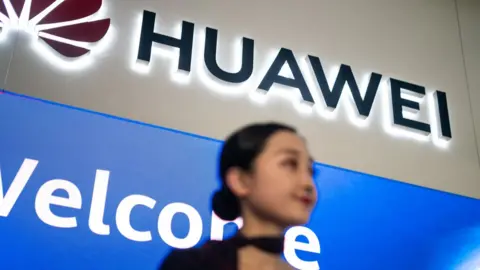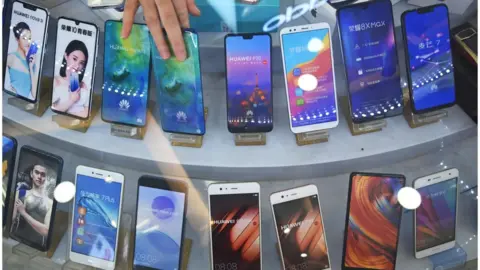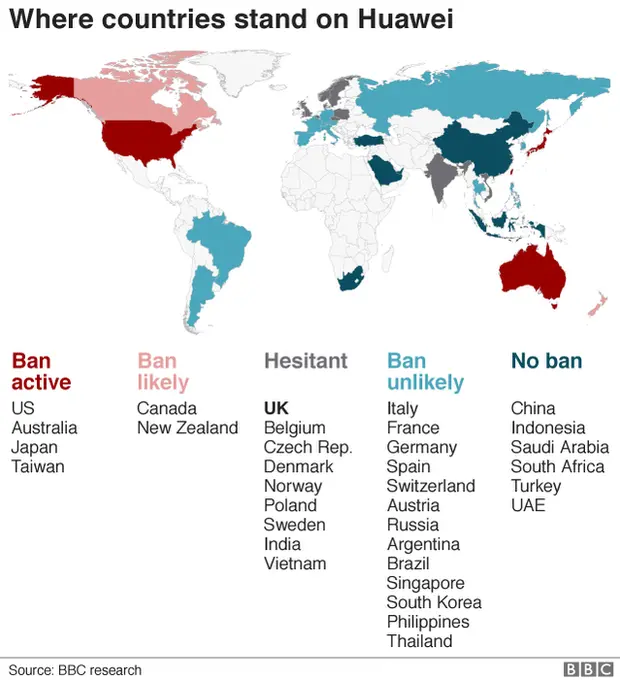Huawei: US blacklist will harm billions of consumers
 Getty Images
Getty ImagesA US move to put Huawei on a trade blacklist "sets a dangerous precedent" that will harm billions of consumers, the firm's top legal officer said.
Speaking at a press conference, Song Liuping said the trade ban would also "directly harm" American companies and affect jobs.
Washington recently added Huawei to a list of companies that US firms cannot trade with unless they have a licence.
The trade ban is part of a wider battle between the US and Huawei.
Washington has moved to block the Chinese company, the world's largest maker of telecoms equipment, on national security concerns.
Huawei has repeatedly denied claims the use of its products presents security risks, and says it is independent from the Chinese government.
"Politicians in the US are using the strength of an entire nation to come after a private company," Mr Song said.
What did Huawei say about the trade ban?
Mr Song said the decision to put Huawei, which is also the world's second largest smartphone maker, on the so-called "entity list" would have far-reaching implications.
"This decision threatens to harm our customers in over 170 countries, including more than three billion consumers who use Huawei products and services around the world."
"By preventing American companies from doing business with Huawei, the government will directly harm more than 1,200 US companies. This will affect tens of thousands of American jobs."
What about other US moves against Huawei?
Speaking to reporters in Shenzhen, Mr Song also outlined steps that Huawei had taken in relation to a lawsuit it filed against the US government in March.
The case relates to restrictions that prevent US federal agencies from using Huawei products.
 Getty Images
Getty ImagesThe firm said it has filed a motion for a "summary judgement", asking US courts to speed up the process to "halt illegal action against the company".
"The US government has provided no evidence to show that Huawei is a security threat. There is no gun, no smoke. Only speculation," Mr Song said.
A hearing on the motion has been set for 19 September.

Analysis: Robin Brant, BBC News, Shenzhen
Sitting up on a stage, in a large theatre-like room at its headquarters, there was much talk from the Huawei executives of America's rural and "poorer" customers who deserve "equitable access" to good broadband.
Billions of customers are facing the threat of having their welfare "damaged" apparently, so the firm wants to speed things up.
The other reason of course is that the assault from the Trump administration is biting. Asked if Huawei would still be around in a year's time, one executive said its business plans go well beyond next year.
The company insists it is - proudly - privately owned. Nonetheless, I asked if the two senior executives present were members of China's prevailing Communist Party. One said he wasn't. The other wouldn't say.


What about the US-China trade war?
Washington's clampdown on Huawei is part of a wider conflict simmering between the US and China.
The US has pushed to persuade allies to ban the Chinese company over the potential risks of using its products in next-generation 5G mobile networks.
Some countries, including Australia and New Zealand, have blocked Huawei from supplying equipment for 5G mobile networks.
Additionally, the company faces almost two dozen criminal charges filed by US authorities. Washington is also seeking the extradition of Huawei executive Meng Wangzou from Canada, where she was arrested in December at the behest of American officials.
It comes as trade tensions between the US and China also appear to be rising.
The world's two largest economies have been locked in a bruising trade battle for the past year that has seen tariffs imposed on billions of dollars worth of one another's goods.
Earlier this month, Washington more than doubled tariffs on $200bn (£158bn) of Chinese goods, prompting Beijing to retaliate with its own tariff hikes on US products.
US President Donald Trump has, however, sought to link the two, saying recently that Huawei could be part of a trade deal between the US and China.